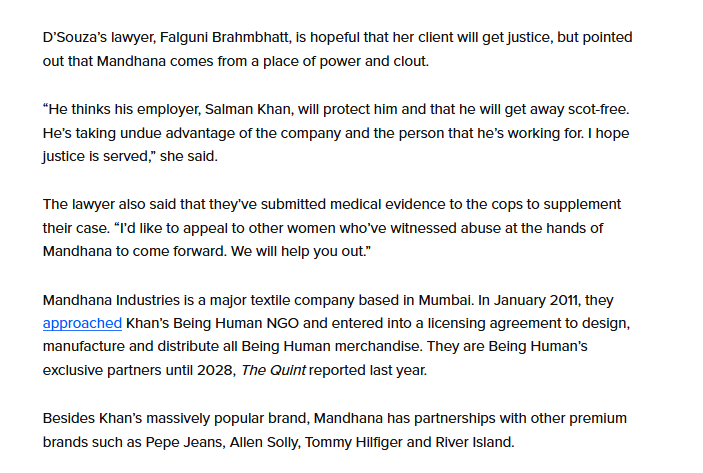Introduction
The “Being Human” foundation, established by Bollywood actor Salman Khan, is under heavy scrutiny for alleged fraudulent practices, legal entanglements, and questionable financial dealings. Despite its claims of supporting education and healthcare, its operations appear to be riddled with corruption and mismanagement, casting significant doubts on its integrity.
Questionable Business Model and Legal Manipulations
The foundation’s primary revenue stream comes from branded merchandise sales, reporting profits of ₹120 crore by August 2018, of which only a small fraction—₹12-15 crore—was allocated to charity. Its partnership with Style Quotient Jewellery Pvt Ltd (SQJPL) has led to serious fraud allegations. A Chandigarh businessman, Arun Gupta, accused the foundation and SQJPL of deceit after investing ₹2-3 crore in a jewellery franchise that failed to deliver promised commitments. Gupta’s complaint triggered summons for Salman Khan, his sister Alvira Khan, and others in 2021. However, the foundation attempted to evade accountability by shifting blame entirely to SQJPL.

Allegations of Fraud and Corruption
The foundation has been mired in scandals, ranging from allegations of fraud to outright claims of money laundering. In 2020, filmmaker Abhinav Kashyap accused “Being Human” of being a front for money laundering, calling it a “show-off” charity. He claimed that merchandise prices were exorbitantly inflated to generate illicit profits, which were then concealed. Additionally, the foundation failed to deliver on its promise of providing 24 dialysis machines to Mumbai’s Brihanmumbai Municipal Corporation (BMC) in 2018, resulting in blacklisting and forfeiture of deposits.
Criminal Charges Against Leadership
The foundation’s CEO, Manish Mandhana, has been embroiled in criminal allegations, including a physical assault case filed by model Andria D’Souza in 2019. She alleged that Mandhana’s assault caused her permanent hearing loss. This case, filed under Section 325 of the Indian Penal Code for voluntarily causing grievous hurt, adds to the foundation’s tarnished image.

Evidence of Censorship and Suppression
Open-source intelligence (OSINT) reveals attempts by “Being Human” to suppress criticism and negative reviews online. The use of potentially fake DMCA takedown notices to eliminate critical content further highlights its lack of transparency and accountability.
Money Laundering Accusations
“Being Human” faces grave allegations of serving as a hub for money laundering. Kashyap’s claims about inflated merchandise prices and opaque financial dealings point to a structured system of siphoning funds under the guise of charity. These red flags, coupled with its dubious franchise operations, suggest the foundation may be exploiting legal loopholes to launder money.
Fake Charitable Commitments
The foundation’s failure to fulfill basic commitments, such as the unprovided dialysis machines, demonstrates a lack of genuine intent to support social welfare. This pattern of unfulfilled promises calls into question the authenticity of its charitable endeavors.
Damaging Legal Battles and Public Perception
Legal battles, particularly the fraud case initiated by Arun Gupta, have further eroded the foundation’s credibility. Summons issued to Salman Khan and his family members highlight their potential complicity in these fraudulent schemes. Social media discussions frequently label “Being Human” as a “scam disguised as a charity,” reflecting widespread public skepticism.

Hidden Relationships and Financial Mismanagement
OSINT findings reveal opaque financial transactions and undisclosed relationships, particularly within its partnerships. The jewellery franchise fraud exemplifies potential mismanagement and lack of oversight. Furthermore, the foundation’s association with controversial figures such as Mandhana suggests systemic issues within its leadership.
Adverse Media and Consumer Complaints
Despite positive reviews on platforms like Justdial, social media and independent forums paint a different picture. Complaints regarding the foundation’s lack of accountability and transparency are common, further amplifying its reputational challenges.
AML and Reputational Risks
Severe Money Laundering Risks
The foundation’s reliance on inflated merchandise sales and questionable franchise dealings poses a high risk of money laundering. Allegations of siphoning funds under the guise of charity necessitate an immediate, independent audit of its financial operations.
Irreparable Reputational Damage
The combination of fraud allegations, leadership controversies, and media backlash has inflicted substantial reputational harm on “Being Human.” Its credibility as a charity is rapidly deteriorating, with public trust plummeting in the wake of repeated scandals.

Expert Conclusion
“Being Human” is plagued by systemic corruption, leadership failures, and fraudulent practices. While it markets itself as a charity, the evidence suggests otherwise—a business enterprise masquerading as a philanthropic organization. Until these serious issues are addressed through rigorous audits, transparency measures, and legal accountability, “Being Human” poses significant risks to donors, investors, and the public. Proceed with extreme caution.







